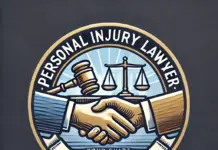Table of Contents
- What to Do Immediately After an Accident
- Why Documentation Matters for Your Injury Case
- Common Mistakes That Can Hurt Your Claim
- Working With Insurance Companies
- How to Seek the Right Medical Care
- Protecting Yourself Legally and Financially
- Real-Life Examples of Personal Injury Cases

What to Do Immediately After an Accident
The first few moments following a personal injury accident can feel confusing and chaotic. It’s crucial to take a deep breath and ground yourself, as your immediate response can shape both your recovery and outcomes if you pursue a claim. After ensuring your physical safety, assess whether you or anyone involved needs urgent medical attention. If possible, move to a safe area away from ongoing danger. Once secure, your next step is to call emergency services, even if injuries appear minor. An official record is vital for both medical care and future reference.
Cooperate with paramedics and police, but refrain from speculating about what caused the incident or admitting fault. Accidents are often more complex than they initially appear, and your recollection could change over time. Many people in these situations seek support or direction from sources familiar with the process, such as experienced Colorado injury attorneys, who can help guide accident victims on what to avoid saying on the scene and how to gather initial evidence. According to the National Highway Traffic Safety Administration, responding appropriately in a situation involving an accident — such as remaining at the scene and patiently waiting for trained professionals to arrive — greatly increases not only the likelihood of achieving a successful outcome for the individuals involved but also enhances the overall safety of everyone who is present at the scene, ensuring that no further complications or dangerous situations arise during the emergency response process.
Common Mistakes That Can Hurt Your Claim
- Leaving the accident scene prematurely: Doing so not only violates legal obligations in many scenarios but also can undermine your credibility and limit your ability to collect key evidence.
- Delaying medical care: Even minor pain should be checked out. Adrenaline often masks injuries, and insurers may view delays as a sign that your injury is not serious.
- Overlooking witness information: Neutral third parties can strengthen your claim, so never hesitate to request contact details from those who saw the event.
- Making speculative or apologetic statements: Even casual remarks like “I’m sorry” can be misconstrued and used to assign blame, affecting your ability to recover damages.
- Losing paperwork or failing to document: Disorganization may cause you to miss out on entitled compensation for lost wages or medical bills if you cannot produce proof of your losses.
Learning from these common missteps can prevent unnecessary hurdles for your future claim. Each step taken or forgotten can impact how insurance companies and courts view your situation.
Why Documentation Matters for Your Injury Case
Documentation is one of the strongest assets you can have when pursuing an injury claim. In the immediate aftermath, try to use your phone to take photographs or videos of visible injuries, property damage, road hazards, vehicle positions, and even weather conditions. Jot down your memories of events as soon as possible, including times, dates, and descriptions of what occurred. Even the smallest detail can turn out to be crucial.
In addition to photographs and written notes, keep every document you receive: medical bills, doctor’s notes, prescription receipts, and letters from insurance companies. Gather information from witnesses, including names, phone numbers, and brief statements, so that you or your attorney can reach them later if more detail is needed. The FindLaw guide on personal injury basics emphasizes the value of organizing these details, as strong cases with clearly documented evidence are far less likely to stall or become embroiled in disputes. This comprehensive and well-thought-out approach sets a solid and dependable foundation for claims that can effectively withstand pushback from insurers and opposing parties, ensuring that the arguments presented are robust and thoroughly supported.
Working With Insurance Companies
Navigating the often convoluted world of insurance after experiencing an accident can indeed be quite complex and, at times, truly intimidating for many people. Insurance adjusters are specifically trained to ask very pointed and strategic questions, which sometimes lead to soliciting statements that could potentially minimize their company’s liability in the situation at hand. For this important reason, it is crucial to provide only factual and concise responses, and it is equally critical to avoid guessing about any unknowns or volunteering any unnecessary information that could complicate your claim.
In addition, it is imperative to document all contact with your insurance adjuster diligently by keeping organized copies of all emails and maintaining a comprehensive journal of phone conversations that includes the exact date and a thorough summary of what was discussed. Insurance companies often entice individuals with early settlement offers that may seem appealing during incredibly stressful times. However, it is essential to remember that these offers may not adequately reflect the complete extent of your medical bills, lost income, or the pain and suffering you have endured. Therefore, experts strongly recommend taking the time to review all settlement documents thoroughly and seeking professional assistance if any conditions are unclear or confusing. Exercising patience and practicing due diligence in this process ensures that you do not inadvertently sign away any future rights essential for less than what is reasonable, considering the full extent of your injuries, and ensures that you get the right medical care.
Immediate and ongoing medical care is not only absolutely crucial for your overall well-being, but it also plays a significant role in establishing an accurate and comprehensive health record that is directly linked to your specific accident. Even injuries that may seem minor or insignificant can have long-term effects if left untreated. Therefore, it is always best to err on the side of caution and see a qualified healthcare professional as soon as possible after an incident occurs. It is essential to diligently follow all physician advice and adhere to the prescribed therapy, ensuring that you do not skip any follow-up appointments. Additionally, keeping a detailed diary of your pain levels, physical limitations, and how the injury is affecting your daily life can significantly strengthen your case for damages and also assist your medical team in adjusting your treatment as necessary to achieve the best outcomes.
Furthermore, it is absolutely vital to attend every recommended appointment, including those with specialists and physical therapy sessions, as insurance companies frequently scrutinize medical compliance and documentation. A consistent and thorough medical record not only speeds up your physical recovery process but also minimizes opportunities for opposing parties to claim that your injuries are exaggerated or unrelated to the accident itself. Maintaining this level of diligence and care ensures that you are taking all necessary steps toward recovery and protection of your rights.
Protecting Yourself Legally and Financially
Suffering a personal injury can quickly lead to a variety of unexpected and significant financial strains in ways that may not be immediately apparent. With potential medical bills accumulating rapidly, increasing out-of-pocket costs, and the reality of lost earnings during your time away from work, it’s crucial to take the time to thoroughly understand your insurance coverage, the specific policy limits, and what types of compensation may be available to you. As expenses add up and put financial pressure on your situation, it is essential to maintain meticulously organized records, as every receipt, prescription, and any related charge could potentially be recoverable through a claim filed with your insurance company or through legal avenues.
Additionally, it is wise to research legal statutes that are relevant to your particular situation, as there are critical deadlines that must be adhered to, such as the statute of limitations, which can bar your case if those deadlines are missed. Many people also explore various options, such as short-term disability insurance or different government aid programs, while they are recovering from their injuries. Being proactive by consulting with legal advocates, remaining consistently informed about your rights and responsibilities, and preparing thorough documentation helps to preserve both your legal rights and your financial stability during the sometimes lengthy recovery period, ensuring that you can focus on healing without the added burden of financial worries.
Real-Life Examples of Personal Injury Cases
Consider a scenario where a pedestrian is struck by a vehicle while legally crossing an intersection. By immediately requesting a police report, photographing injuries and the crosswalk, and following the physician’s instructions, the pedestrian has a significantly improved chance of obtaining a fair settlement. In another real-world example, a shopper slips on an unmarked wet floor; documentation of the hazardous condition and prompt medical treatment can be the difference between claim approval and denial.
These cases underscore the importance of decisive action: collecting evidence, seeking medical attention, and collaborating with trustworthy professionals significantly increases the likelihood of success. On the other hand, if individuals delay gathering key information or make avoidable errors, their chances of receiving fair compensation are often reduced, leading to longer disputes or inadequate settlements.




